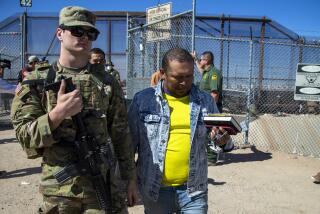Local Seabees to Take Down U.S. Camps in Bosnia
- Share via
Nearly 500 men and women in a construction battalion from the Port Hueneme Navy base will be shipped to Bosnia within a week to dismantle military camps set up for the peacekeeping operation, Navy officials said Thursday.
Naval Mobile Construction Battalion 40 is expected to remain in Bosnia through January, marking the beginning of the end for the U.S. operation in the Balkans.
The Seabees, as construction battalions are commonly called, have been stationed in Rota, Spain, since June as part of their regular seven-month rotation, Navy officials said.
Their deployment will mark the first time since 1994 that local Seabees have been sent to Bosnia.
Although the war that ravaged the country is over, the Seabees must still prepare for random violence and the bitter cold of the Balkan winter, said Master Chief Michael J. Murphy. There are about 15,000 U.S. troops still stationed there, Murphy said.
“We have a heightened awareness about going into an area that is war-torn,” said Murphy, who will be leaving California in the next few days to join the Seabees. “But, we are very proud to make a contribution to peace in the world.”
For local military families, who were briefed by Murphy on Wednesday night, the pain of having their loved ones deployed to the region is difficult to bear. Janece Pollock’s husband, Dale, will be sent to Bosnia, leaving her and their two children to spend their first Christmas without him.
“It is a big expense to have him come back and forth . . . but hopefully he will come home [in early January],” said Pollock, whose husband has been in the Navy nine years. “But it doesn’t make it any easier. It is still upsetting to know they are going.”
The 480 Seabees who will depart from Spain will be working six days a week, 12- to 14-hour days. They will arrive at Camp Colt, which is north of Tuzla, and begin tearing down the makeshift tent cities that were built on top of farmland, Murphy said.
In addition, the battalion will help construct wider supply routes, because there will be heavy traffic, hampered by snow, as troops begin pulling out.
“We need to restore the land so the farmers can get back to farming,” Murphy said.
Their biggest foe will not be sniper fire, but cold weather and dehydration, Murphy said. Temperatures can get below zero with
a strong wind chill factor in the region near the Sava River. To prevent hypothermia from setting in, the battalion has been getting rigorous prevention training.
On Wednesday night, Murphy attempted to quell relatives’ fears about the operation. He explained the current peace that had been reached between the warring Serb and Bosnian factions, as well as the logistics of their operation.
Phone calls, he said, would be expensive--probably prohibitive considering Seabee salaries. But, he added, they can always write letters during their down time.
For Pollock, the Bosnia deployment is easier to endure than when her husband was sent to the Persian Gulf. She gave birth to their son Clint while her husband was away. This time, she has decided to take her children to Utah, where her parents live, to spend Christmas.
Being a military wife, she said, she has grown accustomed to her husband’s absences. But experience does not ease her solitude. She volunteers with the military’s family support group, helping the newer military spouses adjust to the strain of seven-month absences.
She said she writes a letter to her husband every night, almost as a ritual that is her form of therapy.
“When you are feeling blue, you can pick up a letter and read [it], and it’s fresh,” said Pollock, referring to her husband’s letters. “With a phone call, it’s nice to hear his voice, but when you hang up, that’s it.”
Added Murphy: “The family support groups really help the novices. Families are very, very important for military readiness.”
More to Read
Sign up for Essential California
The most important California stories and recommendations in your inbox every morning.
You may occasionally receive promotional content from the Los Angeles Times.













